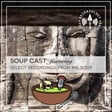
Colston 4 Acquitted: Is Something Wrong with Our Jury System? - WB 7th Jan 2022
Welcome to Watching Brief. As the name implies, each week Marc (Mr Soup) & Andy Brockman of the Pipeline (Where history is tomorrow's news) cast an eye over news stories, topical media and entertainment and discuss and debate what they find.
#archaeologynews #thepipeline #archaeosoup
Support us on Patreon: https://www.patreon.com/archaeosoup
***
0:00 Introduction
1:36 A Brief History
9:29 Protest, Trial, Aquittal
18:32 An Archaeological Perspective
24:44 A Legal Precedent?
35:17 Final Comments
***
Link of the Week:
Secret Barrister Commentary:
***
Links:
A Knee on His Neck: George Floyd’s America:
https://www.washingtonpost.com/graphics/2020/national/george-floyd-america/policing/
Edward Colston Statue Toppling and Colston Timeline of Events:
https://www.bristolpost.co.uk/news/bristol-news/edward-colston-statue-toppling-timeline-6444863
Bristol’s Slavery ‘Cancer’ was ‘Surgically Removed’ by Colston Four, Says Historian David Olusoga:
The Secret Barrister: Do the Verdicts in the Trial of the Colston 4 Signal Something Wrong with Our Jury System? 10 Things You Should Know:
Discussing the Toppling of Edward Colston Statue in Bristol - Live Stream:
Outrage as 'Space Archaeologist' Sarah Parcak Advises How to Topple Statues!? - WB June 2020
Muppets of the Month: Thugs 'Defend' Statues from No One & Fight the Police! - WB June 2020
Statue Wars, UNCHARTED: Golden Abyss, Age of Samurai: Media Picks - WB 2nd July 2021
